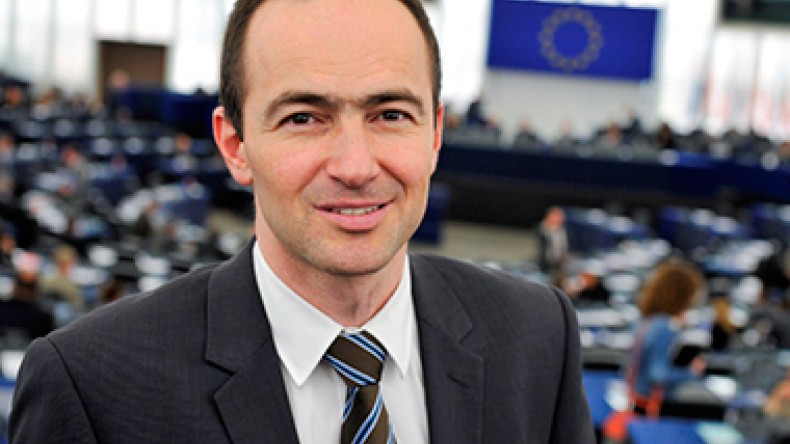
EU is Strengthening Relations with Armenia according to the New EP resolution: Interview with MEP Kovatchev
On 9 July 2015 the European Parliament (EP) adopted a resolution titled Review of the European Neighbourhood Policy (ENP) . Panorama.am has spoken with Bulgarian MEP, member of European Friends of Armenia Europe-Armenia Advisory Council Andrey Kovatchev about the implications and the importance of the resolution for Armenia and Nagorno Karabakh.
According to Dr. Kovatchev the new EP resolution is important in that it “calls for a more tailored approach and flexibility in the Neighbourhood Policy, unlike the previously practiced one-size-fits-all policy, which provided the same association contract to all the Eastern partners”.
“Now we see that the reality is a bit different and countries like Armenia, which are not going to sign the Association Agreement but would like to strengthen their relations with the EU in certain areas, should be able to do this”, - he noted.
Dr. Kovatchev also said that they are interested in keeping Armenia on the European track, as long as Armenia is willing and committed. The EP would like Armenia to continue with the steps towards European integration and to have a sectoral participation in the areas that are of interest to Armenia. These, among others, include visa facilitation and liberalization, education, fight against corruption, democracy building, Armenia’s participation in EU agencies and programs such as FRONTEX, EUROPOL or Erasmus for young people. The resolution also envisions strengthening of cooperation in the spheres of economy and security and implementation of programs that will improve the democratic institutions of Armenia and the standards of living of the Armenian citizens, he noted. The new resolution thus provides a renewed platform for EU-Armenia cooperation.
In terms of the improvement of the security situation of Armenia Dr. Kovatchev particularly highlighted the importance of opening the border between Armenia and Turkey. “We always call to Turkey for more openness and improvement of the relations with Armenia,” – he said and mentioned that the EU should encourage both sides to move forward with the dialogue and with the opening of the border. He noted in this regard that the EP is trying to talk with all the sides and in all kinds of formats, including the regional frameworks, such as Euronest Parliamentary Assembly, where Armenia is very active, as well as the pan-European structures (such as European political parties).
The resolution also includes provisions that have relevance to the Nagorno-Karabakh conflict. The resolution namely “stresses the need to actively promote and assist in the peaceful settlement of conflicts and in post-conflict reconciliation policies in the EU’s neighbourhood”. It encourages the engagement of the EU Special Representative in confidence-building mechanisms and “calls on the VP/HR and the European External Action Service (EEAS) to develop innovative measures and approaches, including public communication strategies and informal consultations, in order to support dialogue and reconciliation”.
Commenting on this Dr. Kovatchev said that these measures presuppose public communications and informal consultations in order to support dialogue and reconciliation. He mentioned facilitation of communication on the societal level between the Armenians and Azerbaijanis as an important confidence-building element.
As for confidence-building mechanisms that would address the question of the cross-border shootings, Dr. Kovatchev said that the MEPs from the Delegation of Committee of Foreign Affairs had planned a delegation trip to cross the contact line and to go from Azerbaijan to Karabakh and then to Armenia, a plan which hasn’t yet been carried out but might be implemented in the future.
He at the same time noted that even though the international community has been making efforts for achieving reconciliation, the parties regrettably seem to have no political will to do so. “We as a Parliament can only urge and call for such a solution. EU is not a military force as such and its scope of action is limited in that respect,” – he reminded.
Dr. Kovatchev also stressed that the EP supports the Minsk Group framework and the resolution of the conflict based on the Madrid Principles as defined in L'Aquila. “The EU can be active in looking for a solution in NK but the platform is still the Minsk Group… The international community needs to facilitate a mutually acceptable solution”, - he added.
Addressing the question of current tensions between Russia and the EU, which also affect countries like Armenia, the MEP criticized Russia for using its economic and military cards to exert pressure on the neighbouring countries. However, he said that the situation with Armenia is understandable. “Armenia is in a very difficult situation – you need to protect your national interest, while the EU doesn’t have an army… so what can you do if Russia is playing with its security card? This is very understandable from your point of view. Because of this we are ready to continue the cooperation between Armenia and the EU on many levels,” – said Dr. Kovatchev in conclusion.
Newsfeed
Videos






























